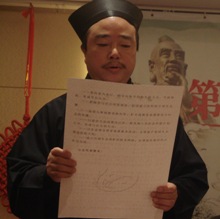|
|
|
|
 |
|
The Mao Shan Declaration, October 2008
 |
 |
 |
Master Ren of Louguantai reading the Mao Shan Declaration. |
茅 山 宣 言
The Mao Shan Declaration
——第三次中国道教宫观生态保护论坛
The Third Ecology Protection Forum of China Daoist Temples and Pagodas
公元两千零八,四川汶川地震,北京举办奥运。大悲大喜之秋,中国道教名山宫观、省市道教协会代表69人,聚首东南福地茅山,与国际环保组织对话,应对全球生态危机,共同致力建设美好家园。
In 2008, an earthquake hit Wen Chuan in Sichuan Province and the Olympics were held in Beijing. In this bittersweet autumn, sixty-nine representatives from Chinese Taoist temples and associations have gathered together in Mao Shan - a blissful place in Southeast China - to discuss ways to counter the global ecological crisis with international environmental organizations in order to build a better homeland.
道家道教,以生为贵,以自然为尊。视万物为平等,视全球为一村。一荣俱荣,一损俱损。今日寰宇,气候变化,灾害频仍,环境恶化,世人痛心。道教生态理念,渊源于老子,光大于道经,宫观生态历久弥新。适逢举国齐心,科学发展,共建和谐,道教与时俱进,继承传统,创新发展,势在必行。
The Daoist philosophy and Daoist religion both emphasize the values of life and nature. They see everything as equal, and the world as a whole, so that when one thing gets hurt, others will be harmed, and when one thing is protected, others will share the benefit.
In today’s world, climate change, natural disasters and environment pollution have become our real concerns. But we are also in a good era, a time when the whole country is united, science has been greatly developed and harmony has become a shared goal. The Daoist faiths therefore recognize that it is necessary to inherit our old tradition, while also advancing with time, and to innovate and make progress.
中国道教宫观生态保护论坛,以遵循“道法自然”为宗旨,以追求天人和谐为己任。从我心做起,从一言一行做起,努力实现我们心中的神圣目标:生态道观,人间仙境。
为达此目标,我们郑重宣告:The Ecology Protection Forum of China Daoist Temples and Pagodas follows the principle that the “Dao Follows Nature” and sees the pursuit of harmony between heaven and human as its obligation. It calls for all Daoists to change our feelings and behavior to realize the sacred goal that we share: to build ecological temples and forge our heaven on earth.
以道教教义为依据,尊老子为生态保护神,合理使用土地、森林、河流、土壤、树木等资源,绿化和美化道观内外的景观,合理配置保护水源和治理污染的设施,建立健全生态保护和宣传教育的规章制度,最大限度地采用节能技术和材料,形成与周边自然环境和社区人群相协调的良性生态圈。
Based on Taoist principles, we hold Lao Zi as our God of Ecology. We advocate a better use of land, forest and water resources, and we call for all the faithful to make the landscape in and around Taoist temples greener and more beautiful. We will also put in place proper facilities that will help protect our water resources and deal with pollution, build systematic plans and regulations that will help to promote environment protection programs, and education, and use energy saving technology and materials in order to build a benign ecological link between living areas and the natural environment.
我们还承诺:在今后的十年里,将以下七个方面作为生态道观建设的重点:
 |
 |
 |
A view from the Mao Shan Temple. |
We also promise that in the next ten years, our ecological temples project will focus on the following seven areas:
加强教职人员培训,增进生态意识,确立环境保护的道教职责
1. Putting great effort into ecological education and training. Expanding materials and education about the natural environment, that will be open to pilgrims and ordinary people who visit our temples and mountains.
坚持教内先行,倡导俭朴节约的生活方式,节能降耗,形成节俭风尚;
2. Advocating simpler lifestyles that will reduce energy and energy costs.
- 积极参与社会环保事业,促进建立良性的全球生态圈;
3. Participating in Social environmental activities with the community.
- 加强与新闻媒体的合作,扩大道教生态思想在全社会的传播;
4. To enhance cooperation with the media to spread the word about ecology
- 以建设生态道观为己任,将其纳入全社会环保计划之中,形成与社会的互动;
5. To build ecological temples as our duty.
- 以生态理念贯穿道教教务活动;
6. Maximizing the ecological benefit we can achieve from our assets.
- 建立宫观生态保护的联系网络,以增进宫观间的合作与交流。
7. Building and maintaining a Daoist Ecological Protection Network.
**** Links
*** Link here for news of the Third Daoist Ecology Forum which opened on 27 October 2008 in Jurong, near Nanjing in Jiangsu Province.
*** Link here to read the Mao Shan Declaration in Chinese and English.
*** Link here for details of Martin Palmer's introductory talk at the Daoist Ecology Forum in Jurong.
*** Link here for details of Martin Palmer's response to the Daoist Ecology Forum in Jurong.
*** Link here for details of UN's representative, Olav Kjorven's speech at the Third Daoist Ecology Forum in Jurong.
*** And link
here to read an article on Daoism and climate change written by Olav Kjorven.
*** Link here for details of Chinese Daoists' Ecology Protection Eight Year Plan.
*** Link here to download the Daoist Eight Year Plan in pdf (209KB).
*** Link
here to download the Mao Shan Declaration in pdf (116KB).
*** Link here for more Daoist eco-news.
|
 |
|
|
|
|
|
 |
Basic teachings of Daoism
A brief summary of Daoist beliefs |
 |
Daoist Monk describes his ecological awakening
Master Ren, senior Daoist monk from Shaanxi province, tells a personal story of the building of Tiejieshu Ecological Daoist Temple. He says the process awakened him to the role of Daoism in environmental issues. “It made me think quite differently about the environment, and how we, as Daoist monks, can protect it,” he said. He urged the 13 other Daoist monks present to be aware of the role of Daoists in today’s environmental protection practice, and to bring this message back to their temples. |
 |
Last updated: September 24, 2009 :
Latest news on the Long Term Commitments
A sample of some of the faith groups around the world that are creating Five, Seven, Eight and Nine Year Plans to protect the natural environment, through the UNDP-ARC framework. |
 |
 |
|
|

